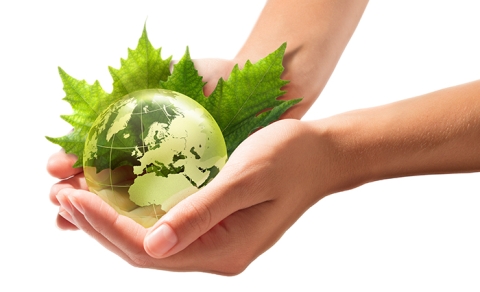Hotel Giants Collaborate With WWF and Greenview To Unveil Industry-Wide Waste Measurement Tool

It’s no secret that waste is a leading sustainability issue plaguing the entire global hospitality industry. In the U.S. alone, nearly 40% of food waste is generated from consumer-facing businesses including restaurants and hotels, according to leading conservation organization World Wildlife Fund (WWF). But while hotels have made important strides in waste prevention and diversion over the last several years, industry-wide waste reduction has presented a significant challenge due to the absence of a common approach in collecting data and measuring and reporting waste. In other words, hotels can’t manage what they don’t measure.
Enter WWF and Greenview, a global sustainability consulting group, which together recently unveiled the Hotel Waste Measurement Methodology, a first-of-its-kind tool designed to support the hotel industry in combating waste and food waste.
Developed in collaboration with leading hotel brands including Accor, Hilton, Hyatt, IHG Hotels & Resorts and Marriott International, the new methodology provides the first comprehensive manual for industry-wide measurement, creating a consistent way for major brands and individual properties to set meaningful waste reduction goals and track their progress over time, according to WWF officials.
“The hotel industry has the unique ability to implement changes that will have global impacts when it comes to managing food waste, and all waste,” said Pete Pearson, WWF global food loss and waste lead. “This new methodology has the potential to be an industry game-changer—putting the power of prevention in the hands of hotels while creating a common industry-wide method to revolutionize the way we manage and measure waste.”
As a valuable addition to an expanding suite of industry measurement methodologies, including the Hotel Carbon Measurement Initiative (HCMI) and Hotel Water Measurement Initiative (HWMI) tools, the Hotel Waste Measurement Methodology lays important groundwork for an industry culture focused on improving operations and producing less waste. Not only does it harmonize data collection methods while addressing common data gaps and challenges, it also empowers hotels to increase business efficiency and make progress in achieving their social and environmental goals.
“Measuring waste uniformly at a hotel and among hotels is enormously challenging and this first version of the Hotel Waste Measurement Methodology represents an important first step in addressing those challenges by setting out key metrics, definitions and approaches,” said Greenview Director Olivia Ruggles-Brise.
She continued, “As companies start using it, and more data becomes available, we will be able to update the methodology to reflect new insights and harness the power of industry benchmarking. This will, in turn, catalyze action across the hotel sector as companies work toward waste reduction and diversion goals.”
A wide range of industry stakeholders reviewed the Hotel Waste Measurement Methodology prior to its release, including WRAP (one of WWF’s strategic food loss and waste partners), Caesars Entertainment, Dorint Hotels & Resorts, Four Seasons Hotels and Resorts, Radisson Hotel Group, Soneva, Wyndham Hotels & Resorts and Sustainability Hospitality Alliance to ensure it addresses the specific challenges faced by hotel companies large and small across the world.
“The methodology will allow for a common approach in the hotel industry to collect and report waste data and complement the Hotel Kitchen training program designed to engage staff, partners and guests in cutting waste in hotel kitchens,” said Chip Rogers, president and CEO of the American Hotel & Lodging Association. “We are excited to see the industry unite to support the efforts and economic challenges in the food waste arena and the impact this methodology will have to further the hotel industry’s social and environmental goals.”
The new toolkit comes as the global hotel industry is being increasingly seen as an important partner in advancing the United Nations Sustainable Development Goals (SDGs) 12.3, which aims to reduce food waste by 50% by 2030, and 12.5, which calls for substantial reductions in overall waste generation through prevention, reduction, recycling and reuse.
“A standard waste measurement approach for hotels is so needed, and it is exciting to see the world’s leading hotel brands team up to do this,” said Kelsey Frenkiel, program manager of the Center for Responsible Travel. “No one knows exactly how much food is wasted along the entire hotel supply chain, and we can only tackle that issue once we start to understand the scale. As we work to address the climate crisis, solutions that standardize and streamline data as much as possible are critical.”
For many hotel companies, the new methodology is a welcome solution to aid their efforts in combating waste and meeting their sustainability goals.
“Waste measurement and reporting are inherently difficult across many sectors, including the hospitality industry,” said Denise Naguib, vice president, sustainability and supplier diversity at Marriott International. “Upon implementation of the methodology, we will be able to generate solid waste and food waste baselines for our global portfolio and begin to track toward our goal to reduce solid waste and food waste 45% and 50% respectively by 2025.”
In bringing the hotel industry together around one common goal, the Hotel Waste Measurement Methodology’s development also demonstrates the power of the kind of collaborative action that will be needed going forward to face humanity’s biggest challenge: saving our environment and mitigating the worst effects of climate change.
“A crucial part of any sustainability strategy is to understand your impact and monitor and report your journey towards improvement,” said Madhu Rajesh, CEO of Sustainable Hospitality Alliance. “By coming together as an industry and sharing expertise, we can develop resources that are designed for the industry context and support every hotel to manage and improve their impact – wherever they are on their sustainability journey.”
Don’t miss any event-related news: Sign up for our weekly e-newsletter HERE and engage with us on Twitter, Facebook, LinkedIn and Instagram!


Add new comment